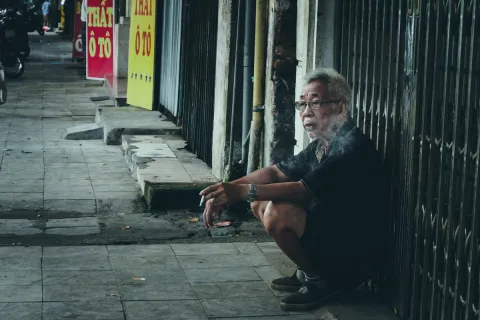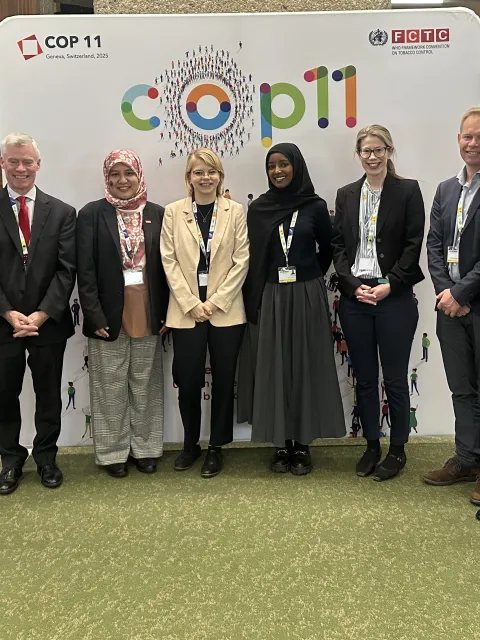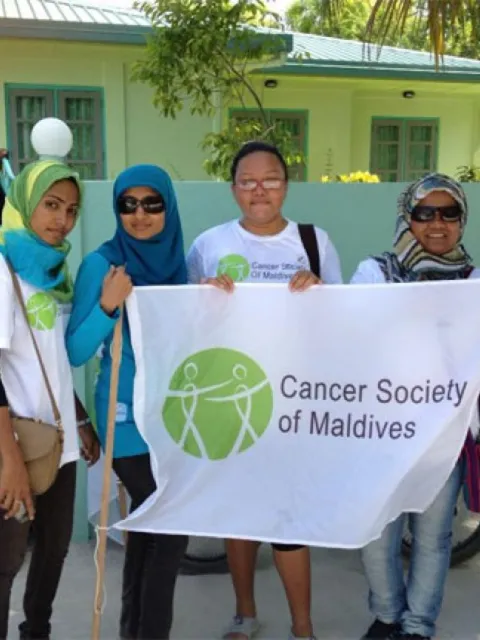Tobacco industry interference in policy decisions undermines effective control
UICC looks at actions by the tobacco industry highlighted in the Global Tobacco Industry Interference Index to undermine efforts by governments to reduce smoking prevalence – and suggests how to counter tobacco industry interference.

Tobacco is considered the leading cause of death worldwide. The product weighs on national economies – to an amount over USD 1 trillion a year – while generating enormous cash flow for the tobacco industry.
The implementation of the WHO Framework Convention for Tobacco Control (FCTC) constitutes a threat to the industry’s business as it aims to reduce smoking drastically through taxation, banning advertising and promotion, creating smoke-free environments and other actions.
How the tobacco industry seeks to influence politics and the public
In response, the tobacco industry seeks to present a different business model and portray itself as socially responsible – while at the same time it continues to use multiple tactics to interfere with laws and evidence-based information that would curb the consumption of tobacco.
Interference occurs at several levels, aimed at multiple stakeholders including manufacturers, advertisers, public relation companies, vendors, government officials with tobacco industry stocks and lobbyists.
In the midst of the ongoing pandemic, tobacco companies have invited heads of state, members of government and high-ranking officials to inauguration ceremonies of new tobacco factories. Former tobacco industry executives have been appointed as senior public officials. Several governments accepted proposals from the tobacco industry to lower taxation during the pandemic, or even delay the implementation of legislation on package warnings with graphic images. And tobacco-related corporate social responsibility activities increased during the pandemic with, for example, donations of masks, ventilators and funds.
All these actions are in clear violation of article 5.3 of the WHO FCTC, which stipulates that countries must protect health policies from the interests of the tobacco industry.
"Efforts by the tobacco industry to whitewash its image, claim that it is moving away from tobacco or interested in promoting public health, should be viewed with utmost reserve and certainly not taken at face value. Organisations and governments should not let their guard down."
– Dr Yannick Romero, Knowledge and Advocacy Manager, UICC
The industry has a history of interference and has been using these well-known tactics for decades. They fund political campaigns, ask for a seat at negotiation tables and draft sample legislation. Furthermore, tobacco companies exaggerate their contribution to economies in terms of tax income and employment.[1] They discredit proven science and conduct their own biased studies or set up front groups as self-claimed “grassroots” movements to stir up public controversy and muddy the waters on topics such as second-hand smoke and novel tobacco products, with tobacco industry research frequently quoted in the media.
A timely release of the Global Tobacco Industry Interference Index, before the 9th Conference of the Parties
Tobacco industry interference is not always obvious, as it is often not directly connected to tobacco control nor even to the health sector.
Key indicators from the Global Tobacco Index
Research was conducted in 80 countries, both Parties and non-Parties to the WHO FCTC. It was based on publicly available information and used multiple indicators to rank countries according to the influence of the tobacco industry at the public and political levels.
These indicators include:
- The industry's participation in policy development;
- tobacco industry-related corporate social responsibility activities;
- benefits given to the tobacco industry;
- unnecessary interaction between government and industry;
- measures for transparency;
- preventing conflicts of interest; and measures that prevent industry influence.
For this reason, civil society has developed the Global Tobacco Industry Interference Index (Index), a comprehensive report, produced by the Stopping Tobacco Organizations and Products (STOP) project, that details efforts by governments around the world to address tobacco industry interference. The last edition was published last November.
It serves also the Parties signatory to the WHO FCTC that interference will undermine the effective implementation of measures to curb tobacco consumption. Tobacco industry interference also endangers health and economic recovery following the COVID-19 pandemic.
At the policy level, some governments and country representatives met with the tobacco industry lobby to influence the current status of tobacco products regulations. For instance, the tobacco industry exerted pressure on governments not to increase taxes during the pandemic “to support COVID economic recovery”.
A more general argument used by the industry to resist taxation is that illicit trade and smuggling raise in a high-tax context. However, it has been shown that this is not the case, and this argument has been debunked, with no correlation between tobacco tax increase and smuggling levels.
One of the tactics used by the tobacco industry was to delay legislation by participating to meetings and proposing their own drafts for tobacco products bills or laws. In some countries, tobacco industry lobbied governments to qualify tobacco products as “essential “products, allowing their sales during the pandemic. Other countries have compensated tobacco farmers and allocated tax benefits to producers and the industry.
The report shows that government representatives, decision-makers or policymakers have been previously working for the industry or have been hired by the tobacco industry, which might be perceived as a conflict of interest according to the WHO FCTC. This raises the issue of state-owned tobacco corporations, where tobacco control policies can be influenced by tobacco industry officials.
Finally, the report demonstrated that multiple countries have improved and prevented interference from the tobacco industry since the last report. On the other hand, some struggled to keep away the influence on their tobacco control activities.
How to counter tobacco industry interference
Despite the effort and amount of money expended by the tobacco industry to undermine tobacco control, there are actions that can be undertaken to counter the public and political influence of the industry. These are highlighted in the Index.
The report emphasises coordination across government ministries and public agencies to effectively counter tobacco interference. Governments must end the endorsement of industry activities by public officials and reject any non-binding agreements that have been passed with the tobacco industry.
Governments must also end any incentives provided to the tobacco industry and promote full transparency will respect to their ties with the industry, including disclosure of interest regarding physical and virtual meetings where tobacco companies are represented. Indeed, It is essential, particularly in this time of COVID-19, that tobacco companies are not represented at international events discussing health matters.
The tobacco industry should also be obligated to provide any information about its business, and especially with respect to lobbying and marketing activities with governments, that would provide a more accurate picture of their intentions and the extent of their influence.
“It is in the hands of Governments to curb tobacco industry interference. They have the tool in Article 5.3 of the WHO FCTC, which can be powerful when put to use. It is effective in short-circuiting industry interference.”
– Mary Assunta, Head of Global Research and Advocacy at Global Center for Good Governance in Tobacco Control (GGTC) and a Partner in STOP; principal author of the Global Tobacco Industry Interference Index.
Measures that are known to be effective in reducing smoking will have little effect if they cannot be implemented because the tobacco industry is using the massive funds at its disposal to block legislation where it can. Today, this is generally taking place in low- and middle-income countries that may lack the infrastructure, governance and finances to oppose tactics by the industry to influence its tobacco control agenda.
_______________________________________________
[1]"Health and economic impact of tobacco taxation". In: Effectiveness of tax and price policies for tobacco control (IARC Handbooks of Cancer Prevention, Vol. 14, Chapter 9). Lyon, International Agency for Research on Cancer/WHO, 2011.
Last update
Sunday 04 December 2022
